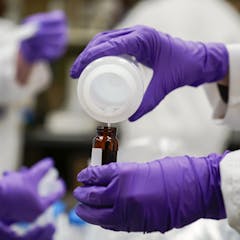
Articles on Cancer risk
Displaying 1 - 20 of 70 articles

Drinking alcohol is normalized in American society. But the ubiquity of alcohol consumption hides its serious health risks, including cancer.

Colon cancer is curable when caught early, but some insurers are either refusing to cover or significantly delaying approval for colonoscopies.

That depends on a number of factors, including the cancer you had initially, as well as your genes, environment and lifestyle.

A 30-minute workout five times a week may be all you need.

These chemicals are now found on almost every part of the planet, including in the bodies of a large percentage of the American public. An environmental health scientist explains the risks.

New research explores the health potential of brief bursts of activity – and how wearables combined with machine learning can reveal health benefits of unexplored aspects of our everyday lives.

Ireland recently passed legislation to introduce clearer alcohol labels to warn about the risks of liver disease and fatal cancers from drinking alcohol. Australia should do the same.

The Biden administration is finalizing the first federal limits on two compounds, PFOA and PFOS, in drinking water. These so-called ‘forever chemicals’ have been linked to numerous health effects.

While lung cancer rates have decreased by 43% in men, they have risen by 79% in women. New screening guidelines and recognizing early symptoms can help address the changing face of lung cancer.

Our study found women aren’t necessarily aware of the link between alcohol and breast cancer. And even when they are, they aren’t always able to ‘choose’ to quit.

Our research shows most women aren’t meeting lifestyle recommendations that can help prevent cancer recurrence.

Avoiding smoking and keeping a healthy weight can cut your risk of cancer.

Almost 4,000 Australians are diagnosed with head and neck cancer each year. Oral cancer is one type.

Social factors influence how likely we are to suffer from many types of disease, including cancer.

These chemicals are now present in water, soil and living organisms and can be found across almost every part of the planet – including 98% of the American public.

There are currently no effective tests to screen for ovarian cancer. But that doesn’t mean there aren’t ways to recognize and prevent it.

A study of over 100,000 people found aspartame and acesulfame K in particular may increase risk of developing cancer somewhat.

Fat cells and cancer cells talk to each other. Specialists in both systems can do the same.

Cow’s milk naturally raises levels of a growth factor strongly implicated in breast cancer risk.

People with Barrett’s oesphagus may still want to be especially careful about eating bacon.





